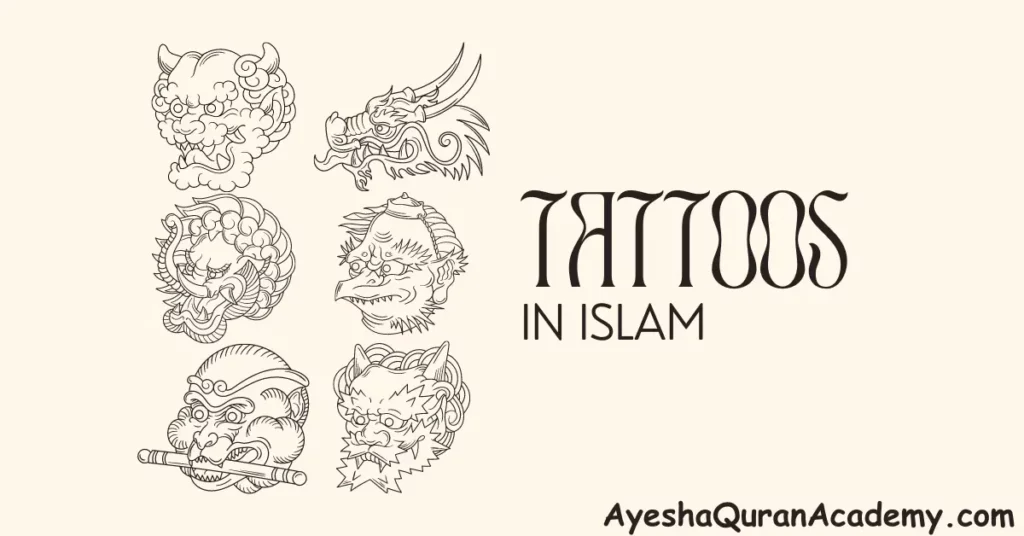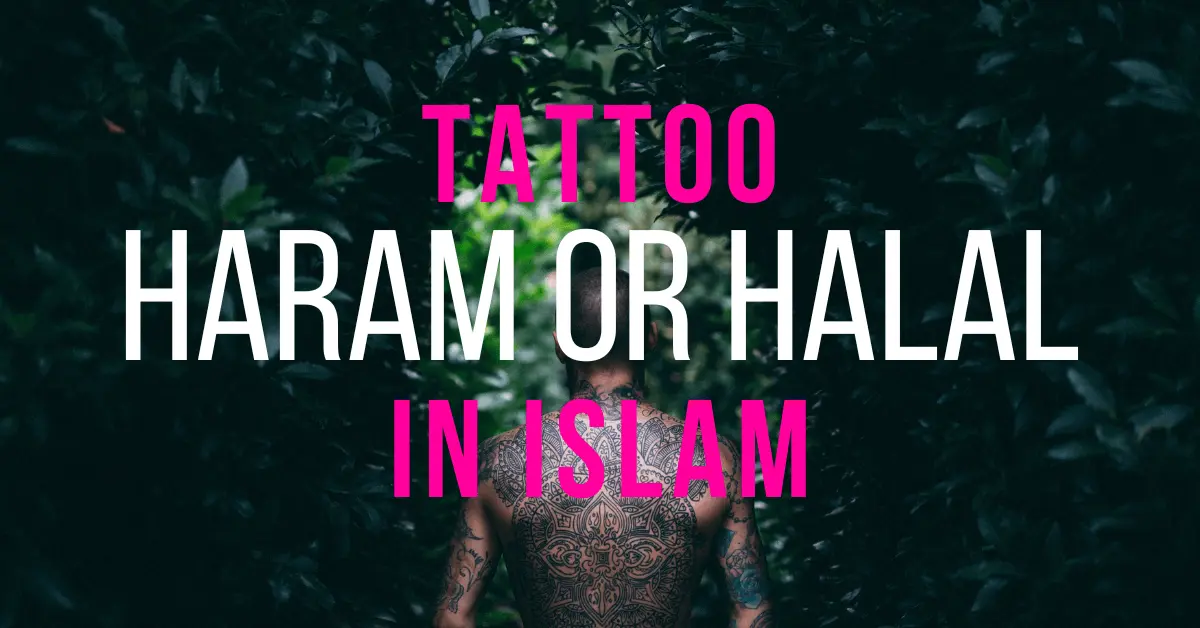Since ancient times, people have used tattoos as a means of artistic expression and as symbols of different cultural, esoteric, and even religious connotations.
However, when it comes to Islam, the question arises: Are tattoos haram (forbidden) according to Islamic teachings?
This discussion explores how religious texts, cultural norms, and individual views can be interpreted.
To know whether tattoos are haram or halal. First, understand what are tattoos? Tattoos are permanent or semi-permanent skin markings created by injecting ink or pigments into the dermis layer with needles.
They are made for decorative, symbolic, cultural, or personal purposes and can take the form of numerous designs, symbols, images, or writing.
Tattoos have been used for ages throughout various nations and civilizations, with meanings and significance varying from one community to the next.
The decision to get a tattoo is deeply personal, and people choose tattoos for a variety of reasons.
However, in some cultures and religions, including Islam, there are discussions about the permissibility and appropriateness of tattoos based on religious teachings and cultural norms.
Are Tattoos Haram?
In simple answer Yes, it are Haram in all forms. Scholars contend that tattoos are haram due to the principle of preserving the body.
Prophet Muhammad (PBUH) cursed those who practiced tattooing and those who got tattoos. Verses in Quran 4:119 and 64:14 exhort Muslims to avoid injuring themselves and to protect their physical bodies as a trust from Allah (GOD).
Historical Context
Tattooing dates back to ancient times and has been practiced across different cultures and societies.
In some societies, tattoos were markers of social status, group affiliation, or even protection against spiritual forces.
In Islam, the question of whether it is permissible or haram is a matter of interpretation based on the Quran, Hadith (sayings and actions of Prophet Muhammad), and Islamic jurisprudence.
Islamic Perspectives
The Quran
Tattoos are not mentioned specifically in the Quran, Islam’s holy book. However, several verses emphasize the value of protecting the body, which some view as banning any sort of body modification, including tattoos.
Verses in Quran 4:119 and 64:14 exhort Muslims to avoid injuring themselves. Verses also exhort to protect their physical bodies as a trust from Allah (GOD).
Hadith
The Hadith literature includes some statements attributed to the Prophet Muhammad that mention tattoos.
One Hadith suggests that Prophet Muhammad cursed those who practiced tattooing and those who got tattoos.
However, there are debates among scholars about the authenticity and context of these Hadiths, which adds complexity to the issue.
Islamic Jurisprudence
Islamic jurisprudence, or fiqh, involves the interpretation and application of Islamic principles in various matters. Different schools of thought have varying opinions on tattoos.
Some scholars consider tattoos to be not permidable due to the preservation of the body principle.
While others suggest they might be permissible under certain circumstances, such as when the intention behind getting a tattoo is not contrary to Islamic values.

Are Tattoos Haram In USA
Tattoos are either haram (forbidden) or legal in the United States or any other country, depending on a person’s personal beliefs, cultural background, and religious convictions.
Tattoo legality and acceptance in the United States are affected by cultural and personal choices rather than religious concerns.
Tattoos are typically legal and largely accepted in the United States as a form of self-expression and body art.
Tattoos are popular in the United States for a variety of reasons, including personal significance, aesthetics, and cultural identification.
For Muslims in the US, the question of whether tattoos are haram or permissible would be determined by their interpretation of Islamic teachings and religious authorities.
Some Muslims may choose to follow the view that tattoos are prohibited based on religious principles.
While others may interpret these teachings differently and see tattoos as permissible under certain circumstances.
Islamic views on tattoos can vary widely within the Muslim community, both in the US and around the world. In simple answer, they are haram all over the world for Muslims
Are Tattoos Haram In UK
In the United Kingdom, the perspective on tattoos is quite similar to that of the United States.
The legality and acceptance of tattoos are primarily cultural and personal, rather than driven by religious considerations.
Tattoos are generally legal and widely embraced as a form of self-expression and body art in the UK.
For Muslims in the UK, the question of whether tattoos are haram (forbidden) or permissible depends on their individual interpretation of Islamic teachings and the guidance of religious scholars.
Just as in other parts of the world, the views on tattoos within the Muslim community in the UK can vary widely.
Some Muslims may believe that tattoos are not in line with Islamic principles and thus consider them haram.
While others may have a more lenient perspective and see tattoos as acceptable within certain boundaries.
Islamic beliefs and practices are often shaped by cultural and individual factors. It means that Muslims in the UK, like anywhere else, may hold diverse opinions on the permissibility of tattoos.
Therefore, while tattoos may be legally and socially acceptable in the UK, the religious viewpoint on their permissibility would ultimately depend on a person’s faith, interpretation of religious teachings, and personal convictions.
It’s important to note that legal and cultural acceptance of tattoos in a country does not necessarily dictate their religious permissibility according to a specific faith’s teachings.
Muslims, like adherents of other religions, often make individual decisions about whether to get tattoos based on their own understanding of their faith and its teachings.
Why Tattoos Are Haram?
In Islam, the concept of what is considered “halal” (permissible) and “haram” (forbidden) is derived from the teachings of the Quran, the holy book of Islam, and the Hadiths. Which are collections of sayings and actions of the Prophet Muhammad.
The prohibition of tattoos (or permanent body modifications) is rooted in these religious sources and the interpretation of scholars over time.
The main reasons why tattoos are considered haram in Islam include:
1. Altering God’s Creation
In Islam, the belief in the uniqueness and perfection of Allah’s creation is paramount. Muslims consider the human body to be a divine creation that reflects the wisdom and design of Allah.
Altering this creation, such as through permanent body modifications like tattoos, is seen as disrespecting the design and form that Allah has chosen for individuals.
The Quran emphasizes the concept of being grateful for the blessings and creations of Allah. And modifying the body through tattoos could be interpreted as a form of ingratitude or dissatisfaction with Allah’s design.
2. Changing the Natural Form
Islam places a significant emphasis on maintaining the natural form of the body. The body is often referred to as an “Amanah,” meaning a trust from Allah.
Modifying the natural appearance of the body through tattoos contradicts this concept of preserving the trust.
Permanent changes to the skin’s appearance, such as adding pigments or designs, are considered a deviation from the natural state that Allah has ordained.
3. Imitating Non-Muslim Practices
During the early days of Islam, tattoos were associated with certain pagan rituals and practices of non-Muslim cultures.
Islam encourages Muslims to differentiate themselves from non-Muslim practices, customs, and beliefs.
This concept is rooted in the Islamic principle of maintaining a distinct identity as a follower of Islam.
Tattooing, if associated with practices of non-believers, can be seen as a form of imitation that goes against this principle of maintaining a unique Islamic identity.
4. Pain and Harm
Islam places great importance on avoiding causing harm to oneself or others. Getting a tattoo involves puncturing the skin with needles to inject ink, which can be painful and potentially harmful.
The act of intentionally inflicting pain on oneself could be considered contrary to the Islamic teachings that emphasize compassion, kindness, and avoiding unnecessary suffering.
Additionally, there may be health risks associated with tattooing, including the potential for infections, allergic reactions, and other complications.
Cultural Influences
Cultural contexts can greatly impact the way tattoos are perceived within Islamic communities. In some cultures, tattoos hold spiritual or cultural significance that is separate from religious considerations.
Muslims living in diverse regions may hold differing views on the permissibility of tattoos based on their cultural upbringing and local customs.
Personal Beliefs
Individual Muslims may hold different perspectives on tattoos based on their personal beliefs and values. Some Muslims may choose to get tattoos as an expression of their personal identity.
While others may choose to abstain from tattoos due to their interpretation of Islamic teachings. The diversity of opinions within the Muslim community highlights the complexity of the issue.
Conclusion
The debate over whether tattoos are haram in Islam stems from the intricate interplay between religious texts, historical context, cultural influences, and personal beliefs.
While some scholars and individuals hold that tattoos are forbidden due to the preservation of the body principle. Others argue that certain conditions and intentions could make tattoos permissible.
It is essential for Muslims to approach this issue with respect for diverse viewpoints and a deep understanding of their faith. They should take into consideration both religious teachings and personal convictions.
FAQs
In Islam, there is no specific punishment outlined in the Quran or Hadith for getting a tattoo. The prohibition against tattoos is rooted in religious principles and interpretations rather than a specified legal punishment.
The consequences of getting a tattoo, if any, would not be a legal penalty imposed by an Islamic authority, but rather a personal and spiritual consideration.
Praying with a tattoo in Islam is generally permissible, as having a tattoo does not invalidate the act of prayer itself. However, it’s important to maintain proper cleanliness and modesty during prayers.
The presence of a tattoo does not impact the validity of the prayer as long as the required body parts are covered and the individual is in a state of ritual purity (wudu or ghusl).
Islamic viewpoints on tattoos vary among scholars and interpretations. Generally, permanent tattoos are discouraged due to altering God’s creation, changing the natural form, imitating non-Muslim practices, and causing pain.


